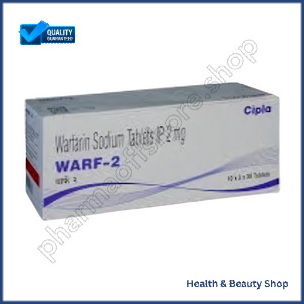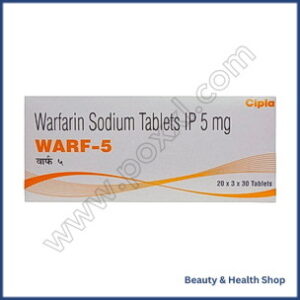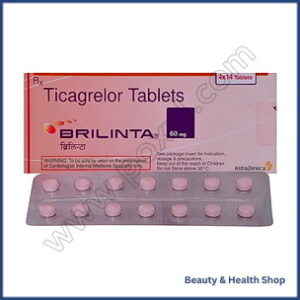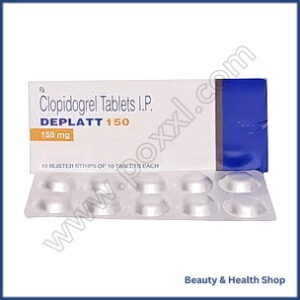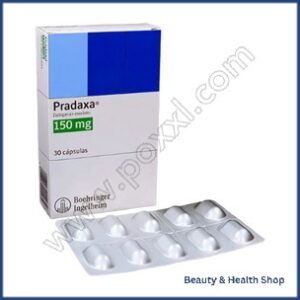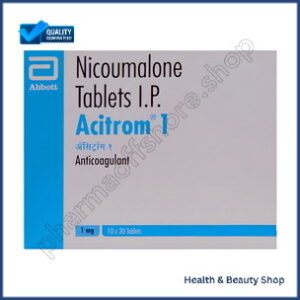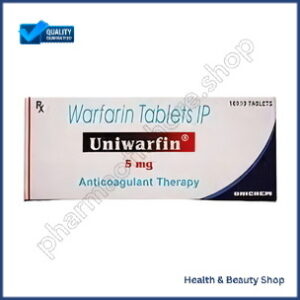Clear and concise, Warf 2 mg, also known as Warfarin, is an essential anticoagulant that works by targeting specific clotting factors in the body to prevent blood clot formation. It plays a vital role in reducing the risk of strokes, heart attacks, and pulmonary embolisms by maintaining proper blood clotting ability, which is monitored through INR tests. Warfarin is commonly prescribed to prevent blood clots in blood vessels, especially for conditions such as atrial fibrillation and artificial heart valves, and to minimize clotting risk during surgeries and medical procedures. Additionally, it is important to follow prescribed dosages based on blood tests, take it once daily at the same time, avoid doubling up on missed doses, and be cautious of potential drug interactions. The proper usage, special precautions, common side effects, and storage guidelines associated with Warfarin are essential for maintaining its effectiveness and safety. Familiarizing yourself with this information will help you understand the importance of using Warfarin correctly.
To begin exploring this topic, consider the essential aspects that will guide your understanding. Warf 2 Mg, commonly known as Warfarin, is a medication primarily used to prevent blood clots and treat various conditions related to blood clotting. Understanding how Warfarin works in your body is critical for managing its effects effectively. Warfarin functions by inhibiting the body’s ability to form blood clots by interfering with the production of certain clotting factors. This helps reduce the risk of serious conditions such as strokes, heart attacks, and pulmonary embolisms.
When taking Warfarin, it is essential to maintain consistent monitoring of your blood’s clotting ability through regular blood tests. These tests, known as INR tests, help healthcare providers adjust your Warfarin dosage to ensure it remains within the therapeutic range for maximum effectiveness. It is also important to follow your healthcare provider’s instructions carefully regarding diet, other medications, and lifestyle habits that can affect Warfarin’s performance. By staying informed and adhering to these guidelines, you can effectively manage your Warfarin therapy and reduce the risk of complications associated with improper usage.
Why is this medication prescribed?
As you explore the medication Warf 2 Mg (Warfarin), understanding why healthcare providers prescribe this medication becomes essential. Warfarin is commonly prescribed to prevent blood clots from forming or growing larger in blood vessels. It is often used in conditions such as atrial fibrillation, where irregular heartbeats can lead to clot formation and increase the risk of stroke. Additionally, individuals with artificial heart valves or a history of blood clots may be prescribed Warfarin to reduce the likelihood of clot-related complications.
Moreover, Warfarin is vital for individuals undergoing certain surgeries or medical procedures that increase the risk of blood clots. By regulating the clotting factors in the blood, Warfarin helps maintain a balance that prevents excessive clot formation. Healthcare providers carefully monitor the dosage of Warfarin to make sure that it effectively prevents clotting without causing excessive bleeding. It is important to follow the prescribed dosage and attend regular check-ups to monitor the medication’s effectiveness and make any necessary adjustments.
How should this medicine be used?
When using Warf 2 Mg (Warfarin), follow the specific instructions provided by your healthcare provider for the safest and most effective usage. Warfarin is usually taken once a day, with or without food, as directed by your doctor. It is crucial to take this medication at the same time each day to maintain a consistent level in your blood. Remember to follow the dosage prescribed by your healthcare provider carefully. Do not increase or decrease the amount of Warfarin without consulting your doctor first. It is typical for your doctor to adjust your dose based on regular blood tests to guarantee the medication is working correctly. If you miss a dose, take it as soon as you remember, but do not double up on doses to make up for a missed one. If you are unsure about how to take Warfarin or have any questions regarding its usage, do not hesitate to consult your healthcare provider for guidance.
Other uses for this medicine
If your healthcare provider deems it necessary, Warf 2 Mg (Warfarin) may have other uses beyond its primary intended purpose. While Warfarin is widely known as a blood thinner used to prevent blood clots, it can also be prescribed for conditions such as atrial fibrillation, heart valve replacement, and deep vein thrombosis. For individuals with atrial fibrillation, Warfarin is often prescribed to reduce the risk of stroke and blood clots due to irregular heartbeats. In cases where a person has undergone heart valve replacement surgery, Warfarin may be necessary to prevent clot formation on the artificial valve. Additionally, for patients with deep vein thrombosis, Warfarin aids in preventing the formation of blood clots in the veins. It is essential to follow your healthcare provider’s instructions meticulously when using Warfarin for these alternate purposes, as the dosage and duration of treatment may vary from its typical use as a blood thinner. Always consult your healthcare provider for personalized guidance on the appropriate use of Warf 2 Mg.
What special precautions should I follow?
Before starting Warfarin, you should check for potential drug interactions with other medications you are taking. This is important to guarantee the effectiveness and safety of your treatment. Consult your healthcare provider or pharmacist for guidance on how to manage any potential interactions.
Check for Drug Interactions
For safety and effectiveness, always check for potential drug interactions before taking Warf 2 mg (Warfarin). It is important to be aware of how Warfarin may interact with other medications or substances to avoid any adverse effects on your health. Here are some key points to keep in mind:
- Consult with your healthcare provider or pharmacist to review all your current medications, including over-the-counter drugs and supplements.
- Inform your healthcare provider about any medical conditions you have, as certain conditions may increase the risk of drug interactions with Warfarin.
- Be cautious with antibiotics, antifungals, and anti-inflammatory medications, as they can interact with Warfarin.
- Avoid drastic changes in your diet, especially with foods high in Vitamin K, as they can impact Warfarin’s effectiveness.
- Regularly monitor your INR levels to make sure Warfarin is working correctly and adjust doses as needed.
What special dietary instructions should I follow?
To maintain consistent levels of Warf 2 Mg (Warfarin) in your system, adhere to specific dietary guidelines. Warfarin is a medication that helps prevent blood clots, and certain foods can interact with it, affecting its effectiveness. It is important to keep your vitamin K intake stable as fluctuations can impact the way Warfarin works. Try to uphold a consistent daily intake of foods rich in vitamin K, such as leafy green vegetables like spinach, kale, and broccoli. Be cautious with alcohol consumption as excessive amounts can interfere with Warfarin’s effects and increase the risk of bleeding. Additionally, limit or avoid cranberry juice and grapefruit juice, as they can also interact with Warfarin. Remember to inform your healthcare provider about any significant changes in your diet so they can adjust your medication if necessary. By following these dietary instructions, you can help guarantee that Warf 2 Mg (Warfarin) effectively manages your condition.
What should I do if I forget a dose?
In case you forget to take a dose of Warf 2 Mg (Warfarin), promptly consult with your healthcare provider for guidance on how to proceed. Missing a dose of Warfarin can impact its effectiveness in managing your condition, so it’s important to seek advice on the best course of action. Your healthcare provider may recommend taking the missed dose as soon as you remember, or they might suggest skipping it and continuing with your regular dosing schedule. It’s essential not to double up on doses to make up for the missed one, as this can increase the risk of bleeding or other complications. Your healthcare provider will consider your individual circumstances and the specific dosage regimen prescribed to determine the most appropriate steps to take. By communicating openly with your healthcare provider about missed doses, you can guarantee that you are managing your Warfarin therapy effectively and safely.
What side effects can this medication cause?
Warfarin, like any medication, can cause side effects. It’s important to monitor your symptoms closely while taking this medication. If you experience any serious side effects, be sure to contact your doctor right away.
Monitor Symptoms Closely
Regularly observe for potential side effects that may arise while taking Warfarin, such as excessive bruising or unusual bleeding. It is essential to monitor your symptoms closely to guarantee your well-being. Some other side effects you should watch out for include:
- Blood in urine or stool
- Severe headaches or stomach pain
- Dizziness or weakness
- Unexplained swelling or pain in joints
- Unusual fatigue or weakness
Being watchful about these symptoms can help you catch any issues early and seek medical attention promptly if needed. Remember, your health is a priority, so don’t hesitate to contact your healthcare provider if you notice any concerning side effects while on Warfarin.
Some side effects can be serious. If you experience any of the following symptoms, call your doctor immediately:
If you notice any of the following symptoms while taking Warfarin, be sure to contact your doctor immediately, as some side effects can be serious. Some side effects that may occur with Warfarin include:
- Unusual bruising or bleeding that does not stop
- Black or bloody stools
- Severe headache or stomach pain
- Vomiting of material that looks like coffee grounds
- Coughing up blood
It is essential to seek medical attention promptly if any of these symptoms manifest. Your doctor will be able to assess the situation and provide guidance on the best course of action to address these potential side effects of Warfarin.
What should I know about the storage and disposal of this medication?
Keep Warf 2 mg (Warfarin) in a cool, dry place away from direct sunlight and moisture to maintain its effectiveness. Store the medication at room temperature between 68-77 degrees Fahrenheit (20-25 degrees Celsius). Avoid keeping it in the bathroom or kitchen where humidity levels can fluctuate. Make sure the medication is tightly sealed in its original container to guarantee protection from air and moisture.
When it comes to disposal, do not flush Warf 2 mg down the toilet or pour it down the drain unless instructed to do so. Consult your pharmacist or local waste disposal company on how to properly dispose of unused or expired medications. They may have specific guidelines for safe disposal to prevent environmental contamination. It is crucial to follow these instructions carefully to ensure that the medication is disposed of in a responsible and eco-friendly manner. If you have any questions regarding storage or disposal, seek advice from your healthcare provider or pharmacist for further guidance.
In case of an emergency/overdose
In the event of an emergency or overdose involving Warf 2 mg (Warfarin), promptly seek medical assistance by contacting your local poison control center or emergency services. If you suspect an overdose, do not delay in seeking help. Symptoms of an overdose may include unusual bleeding or bruising, blood in urine or stools, severe headache, dizziness, or weakness. When you contact emergency services, provide them with information about the amount of Warfarin ingested and any symptoms you are experiencing. It is important to act quickly in cases of overdose to prevent serious complications. Do not attempt to treat the overdose at home or induce vomiting unless specifically instructed by medical professionals. Follow their guidance carefully and provide any additional information they may request. Remember, swift action can help guarantee the best possible outcome in case of an emergency involving Warf 2 mg.
What other information should I know?
For additional important information, consult your healthcare provider or pharmacist regarding Warf 2 mg (Warfarin) and its possible interactions with other medications. It is essential to inform your healthcare provider about all the medications you are currently taking, including prescription, over-the-counter, herbal supplements, and vitamins, to avoid any potential interactions with Warfarin. Warfarin can interact with a wide range of medications, such as antibiotics, antifungal drugs, anti-inflammatory drugs, and certain antidepressants, affecting its effectiveness or increasing the risk of side effects.
Moreover, it is vital to follow your healthcare provider’s instructions carefully when taking Warfarin, including the dosage, frequency, and duration of treatment. Regular monitoring of your blood clotting levels through INR tests is necessary to ensure that Warfarin is working effectively to prevent blood clots. If you experience any unusual symptoms, such as excessive bleeding, easy bruising, or blood in urine or stool, contact your healthcare provider immediately. Finally, avoid making any changes to your Warfarin regimen without consulting your healthcare provider to prevent complications.
Brand names
When considering Warfarin, it is important to be mindful of its various brand names for better understanding and communication with healthcare providers. Here are some common brand names under which Warfarin is marketed:
| Brand Names | Manufacturer |
|---|---|
| Coumadin | Bristol-Myers Squibb |
| Jantoven | Upsher-Smith |
| Marevan | Aspar Pharma |
| Warfant | Cipla Limited |
Knowing these brand names can help you identify Warfarin products when discussing treatment options with your healthcare provider. It is crucial to make sure you are taking the correct medication as prescribed. Always consult your healthcare provider or pharmacist if you have any questions or concerns about the brand of Warfarin you are using. Familiarizing yourself with the various brand names of Warfarin can aid in effective communication and understanding of your treatment plan.
Purchase From Authorized Pharmacies
Acquire Warfarin only from authorized pharmacies to guarantee the authenticity and quality of the medication. Purchasing from authorized pharmacies ensures that you are receiving genuine Warfarin that meets safety and quality standards. Authorized pharmacies source their medications directly from reputable manufacturers, reducing the risk of counterfeit or substandard products entering the market. By choosing to buy Warfarin from these licensed establishments, you can have confidence in the medication’s effectiveness and reliability.
Furthermore, authorized pharmacies employ trained professionals who can provide valuable information and guidance on the proper usage of Warfarin. They can offer advice on dosage, potential side effects, and interactions with other medications to ensure safe and effective treatment. Additionally, purchasing from authorized pharmacies allows for easy access to support services and resources that can enhance your overall treatment experience.
To summarise
Acquire your Warfarin purchase is essential and safe by obtaining it exclusively from authorized pharmacies. Warfarin, commonly known as Warf 2 Mg, is a medication primarily used to prevent blood clots. It works by inhibiting the clotting factors in your blood, thereby reducing the risk of strokes, heart attacks, and other serious conditions. It is important to follow your healthcare provider’s instructions diligently while taking Warfarin, as the dosage can vary based on individual factors such as age, weight, and medical history.
Regular monitoring of your blood clotting levels, typically through INR tests, is vital to make sure that Warfarin is working effectively and safely. Additionally, be cautious of potential interactions with other medications, foods, and supplements that can impact Warfarin’s efficacy. Common side effects may include bruising, bleeding, or unusual tiredness. If you experience severe or persistent side effects, consult your healthcare provider immediately. Remember, always store Warfarin away from moisture and heat, and keep it out of reach of children and pets.


